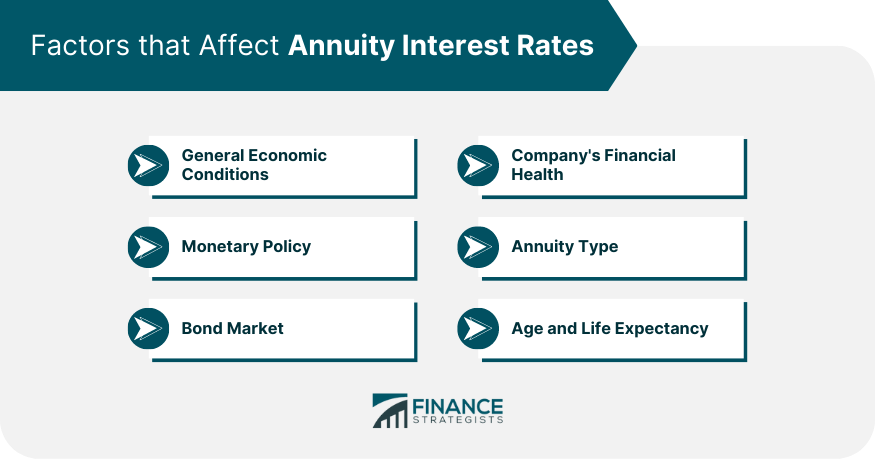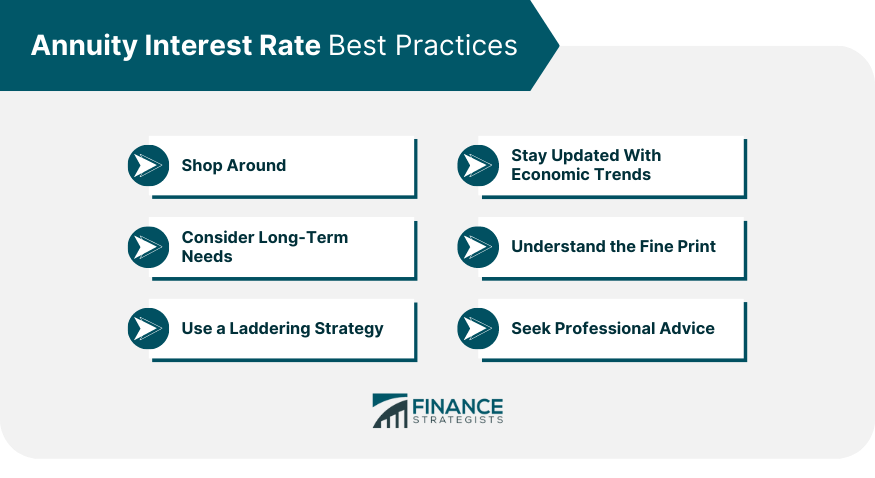What Is the Annuity Interest Rate?
The annuity interest rate is the specified rate at which the funds invested in an annuity accumulate and grow over time. It is a crucial factor in determining the ultimate value of the annuity and the income received from it.
The interest rate directly affects the compounding of the investment, with a higher rate leading to faster growth and potentially bigger payouts.
Understanding the annuity interest rate is essential when evaluating and comparing different annuity options. It helps gauge the potential growth of your investment and the income stream you can expect to receive.
By carefully considering the annuity interest rate, you can make informed decisions about the type of annuity that aligns with your financial goals and risk tolerance.
Factors That Affect Annuity Interest Rates
General Economic Conditions
Economic conditions, such as inflation and unemployment rates, gross domestic product (GDP), and consumer spending, can all influence interest rates. In general, during periods of strong economic growth, interest rates tend to rise.
Conversely, in periods of economic downturn, interest rates are often lowered to stimulate spending and investment.
Monetary Policy
Monetary policy, enacted by central banks like the Federal Reserve in the U.S., is another major factor. When a central bank wants to stimulate the economy, it lowers interest rates, making borrowing cheaper.
This, in turn, can reduce the rates offered on annuities. When the economy is overheating, the central bank might raise interest rates to curb inflation, which could lead to higher annuity rates.
Bond Market
Insurance companies invest heavily in bonds. Therefore, annuity rates are often linked to long-term bond yields, particularly those on government bonds. If these yields increase, so too might the rates on annuities, and vice versa.
Company's Financial Health
The issuing insurance company's financial health can also affect the annuity rates it offers. A company in a strong financial position might be able to afford to offer higher rates than one struggling with financial difficulties.
Annuity Type
The type of annuity you choose also affects the interest rate. Fixed annuities usually offer a guaranteed interest rate, while the rates for variable and indexed annuities are tied to the performance of a stock market index or other investment.
Age and Life Expectancy
The age and life expectancy at the time of purchasing the annuity can also impact the interest rate. The younger you are when you purchase an annuity, the lower the interest rate is likely to be.
This is because the insurer expects to make payments for a longer period.

Types of Annuities and Their Interest Rates
Fixed Annuities
Fixed annuities offer a guaranteed interest rate for a certain period. This means the annuity will grow at the same rate regardless of market conditions.
Fixed annuities can be an attractive option for those who want to know exactly how much they will receive in payments.
Variable Annuities
Variable annuities offer a variable interest rate based on the performance of a portfolio of investments. The interest rate for these annuities can fluctuate based on the returns of the underlying investments.
Variable annuities can potentially offer higher returns than fixed annuities, but they also come with more risk as the payments can vary.
Indexed Annuities
Indexed annuities offer a return based on the performance of a specific market index, such as the S&P 500.
The interest rate on these annuities can vary based on the index's performance, but these annuities typically include a guaranteed minimum return, protecting the annuity owner from a complete loss.
Annuity Interest Rate Best Practices
Shop Around
Different insurance companies can offer significantly different interest rates, so it's important to shop around and compare quotes from various providers. Some independent online tools allow you to compare rates across several companies.
Consider Long-Term Needs
Look at your long-term financial needs and consider how an annuity fits into your overall financial plan. If you'll need income immediately, you might consider an immediate annuity. If you can wait, a deferred annuity might be a better fit.
Use a Laddering Strategy
An annuity laddering strategy involves buying multiple annuities at different times to take advantage of potential interest rate increases. This strategy can help spread the risk of locking in at a low rate.
Stay Updated With Economic Trends
Keep an eye on broader economic trends, particularly the direction of interest rates. This understanding can help you better anticipate potential changes to annuity interest rates.
Understand the Fine Print
Before signing any annuity contract, make sure you understand all the details, including surrender charges, fees, penalties, and any guarantees or riders.
Seek Professional Advice
Given the complexity and long-term nature of annuities, it can be beneficial to seek advice from a financial advisor. A professional can provide tailored advice based on your individual circumstances and financial goals.

Final Thoughts
Understanding annuity interest rates is essential for making informed decisions about annuity investments. The rate at which the money invested in an annuity grows directly impacts the growth of your investment and the income you will receive from the annuity.
Various factors affect annuity interest rates, including economic conditions, monetary policy, the bond market, the financial health of the issuing insurance company, annuity type, and the age and life expectancy of the annuity holder.
To optimize your annuity investment, it is advisable to shop around and compare rates from different insurance companies, as they can vary significantly.
Additionally, considering your long-term financial needs, using a laddering strategy, staying updated with economic trends, understanding the details of the annuity contract, and seeking professional advice are recommended best practices.
These strategies will enable you to make well-informed decisions, mitigate risks, and potentially maximize your annuity investment, ensuring a steady income stream aligned with your financial goals.
Annuity Interest Rate FAQs
The annuity interest rate directly impacts the growth of your investment and the income you receive from the annuity. A higher interest rate can increase your payments, while a lower rate may result in lower income.
Yes, annuity interest rates can vary. They can be influenced by economic conditions, monetary policy, bond market fluctuations, and the financial health of the issuing insurance company. It's important to stay updated with economic trends that may impact annuity interest rates.
No, different types of annuities are affected differently by interest rates. Fixed annuities offer a guaranteed interest rate, while variable annuities have rates tied to underlying investments. Indexed annuities' rates are based on specific market indices. Understanding the nuances of each type is crucial when considering annuity interest rates.
Shopping around and comparing offers from different insurance companies can help you find an annuity with a higher interest rate. You can also consider variable or indexed annuities, which offer the potential for higher returns.
The ability to lock in a higher annuity interest rate after purchasing an annuity depends on the specific terms and features of the annuity contract. Some annuities may offer options to take advantage of rising interest rates, such as annuity laddering strategies or the ability to reset the interest rate at certain intervals. However, not all annuities provide such features. It's essential to carefully review the contract and consult with a financial advisor to understand if and how you can potentially secure a higher interest rate if rates increase.
True Tamplin is a published author, public speaker, CEO of UpDigital, and founder of Finance Strategists.
True is a Certified Educator in Personal Finance (CEPF®), author of The Handy Financial Ratios Guide, a member of the Society for Advancing Business Editing and Writing, contributes to his financial education site, Finance Strategists, and has spoken to various financial communities such as the CFA Institute, as well as university students like his Alma mater, Biola University, where he received a bachelor of science in business and data analytics.
To learn more about True, visit his personal website or view his author profiles on Amazon, Nasdaq and Forbes.











